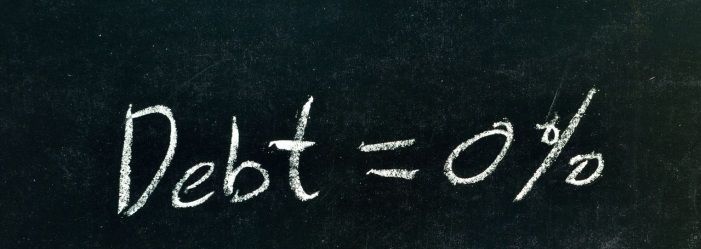Last Updated: December 07, 2023
Consider These Thing To Live Debt-Free

When it comes to the average American, 40% of people live paycheck to paycheck and 60% can't afford an emergency expense over $400. Despite the dire statistics, there is hope for living a debt free life without too much stress.
Using your own personal creativity in addition to the practical tips listed below can help you get out of debt quickly while staying committed long term!
1. Make a budget and stick to it
I think that one of the best ways to get your finances in order is by creating a personal budget. This will allow you to know where all of your money is going each month and hopefully be able to manage it better.
Start with your monthly income - your take home pay or net earnings, after taxes are taken out. Add up all of the money that comes in from any other income sources you may have (child support, alimony payments, disability benefits).
Subtract what needs to go toward essential expenses (rent/mortgage payment for living space; utilities such as gas and electric bills; food costs like groceries and dining out).
Compare this figure with the amount of debt you owe on credit cards, school loans, car leases or mortgages. If you owe more than this amount, you may need to find ways of earning extra income or cutting back on expenses.
2. Create an emergency fund of at least $500
An emergency fund is a source of money that can be used to cover expenses in the event something goes wrong. The debt-free person should have at least $500 set aside for emergencies and unexpected events; this will help keep your debt levels from getting too high, or worse yet, snowballing into more debt with late fees and penalties as debt collection agencies take hold.
Saving up enough money for emergencies can be a real challenge. One way you might do this is by saving small amounts from each paycheck that are not otherwise budgeted over time, or setting aside some of the funds in your checking account every month after paying bills to build it back up again.
Another option would be having automatic deposits through your bank account on payday so you don't even have access to them unless there's an emergency situation.
3. Pay your bills on time so you don't get late fees
It is a common misconception that if you pay your bills on time, there will be no late fees. But what many people don't realize is that even when you pay on time, the company may charge an interest fee or a minimum monthly payment fee which can add up over the course of months.
If you have a credit card with an interest rate of 24% and pay $200 per month, it will take about 20 years before your debt is paid off. If instead, you had been charged a late fee each time your bill was more than 30 days past due, over the course of 20 years, those fees would amount to more than $700.
4. Save for retirement by contributing to your 401k or IRA
The need to save for retirement is all the more pressing as we live longer, but if you don't have a lot of money to invest or want a simpler way to set aside some cash today and earn income from it later, there are other options. You can start with your 401k or IRA.
A 401k is an employer-sponsored plan that allows you to contribute pre-tax earnings up until the annual limit - right now $18,000. A Roth IRA lets you put in after-tax dollars which means your investment grows without any taxes on the gains when you withdraw funds at the retirement age. If this sounds like something that might work for you, go talk about it with a financial planner who will help figure out what's best for you.
5. Build up your credit score by paying off old debt and not applying for new loans
Credit scores are a big deal. The better your credit score is, the more likely you will get approved for loans and benefits like car insurance rates. One of the best ways to build up your credit score is by paying off old debt and not applying for new loans.
If you need to borrow money then apply for a secured loan that offers collateral as opposed to an unsecured loan or cash advance with no collateral.
6. Don't spend more than 50% of what you make each month
This is one rule that will help keep your finances in order and avoid going into debt. It may seem impossible at first, but when you start to get into debt it feels like there is no end in sight.
You can set aside a certain amount of money for groceries and entertainment (dining out, movies). But if you spend more than 50% on those two categories then you'll need to cut back or make some extra income. Otherwise it will be too hard to pay off debt later.
FAQs
Final Thoughts
You might think that living without debt is a pipe dream in today's society, but that’s not true. If you stick to the tips listed above and re-examine your finances from time to time then it becomes more and more attainable!
What questions do you have about reducing your debt? Schedule a
free consultation today so we can help answer them.
✔ Accredited by Better Business Bureau with BBB A+ rating (4.93 rating and 1678 reviews)
✔ US News and World Reports and Bankrate ranked Pacific Debt Relief as one of “The Best Debt Relief Companies of 2024”
✔ 6.9 star rating by BestCompany.com (over 2379 client reviews)
✔ 4.8 star rating by TrustPilot based (over 1613 verified consumer reviews)
✔ ConsumerAffairs.com Accredited (over 544 verified reviews with an average rating of 5 stars)
✔ A Top 10 Rated Compan by TopTenReviews.com , ConsumersAdvocate.com and Top10debtconsolidation.com
✔ 4.6 star rating by Google (229 client reviews)
✔ 100% rating by SuperMoney (9 client reviews)
Reduce Your Credit Card Debt By Up to Half

BBB Reviews | 4.9/5.0 Rating









 Do Not Sell My Personal Information
Do Not Sell My Personal Information